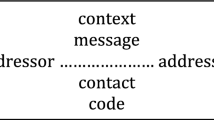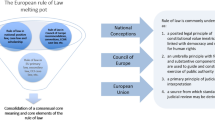Abstract
For hundreds of years procedural rights such as habeas corpus have been regarded as fundamental in the Anglo-American system of jurisprudence. In contemporary international law, fundamental norms are called jus cogens. Jus cogens norms are rights or rules that can not be derogated even by treaty. In the list that is often given, jus cogens norms include norms against aggression, apartheid, slavery, and genocide. All of the members of this list are substantive rights. In this paper I will argue that some procedural rights, crucial for the fair functioning of criminal proceedings, such as habeas corpus, should also have the status of jus cogens norms. I will begin by explaining what it means for a right to have jus cogens status. And I will follow this with a defense of having procedural rights like habeas corpus added to the list of jus cogens norms. I will then rehearse some of the debates about the jus cogens status of procedural rights in the European Commission on Human Rights. At the end of this paper, I will look at the attempts to deal with the abuses at Guantanamo by the American Commission on Human Rights, and by the US and Australian courts, as a way to understand why there needs to be a stronger support for habeas corpus than is today provided by regional courts.
Similar content being viewed by others
References
Aristotle, Nicomachean ethics, Book V, Chap. 10, 1137b10.
Blackstone, W. (1765, 1979). Commentaries on the laws of England (Vol. I). Chicago: University of Chicago Press.
Bracton 474–477 (1883). Sir Travis Twiss, ed., Bracton, De Legibus et Consuetudinibus Angliae (London: Longmans and Co., 1883). A constitutional history of Habeas Corpus, Westport, CT: Greenwood Press [quoted in Duker, W. F. (1980)].
Case Concerning the Barcelona Traction, Light, and Power Co., Limited, Second Phase (1970). Belgium v. Spain, 1970 I.C.J. 3, 1970 WL 1.
Charlesworth, H., & Chinkin, C. (1993, 2010). The gender of Jus Cogens. Human Rights Quarterly, 15, 63–76. (Reprinted from Philosophy of Law: Classic and Contemporary Readings, pp. 610–619, by L. May, & J. Brown, Eds., Oxford: Wiley/Blackwell).
Clark, D., & McCoy, G. (2000). Habeas Corpus: Australia, New Zealand, The South Pacific. Sydney: The Federation Press.
Criddle, E. J., & Fox-Decent, E. (2009). A fiduciary theory of Jus Cogens. Yale Journal of International Law, 34 (Summer).
Feller, E., Turk, V., & Nicholson, F. (2003). Refugee protection in international law. NY: Cambridge University Press.
Franck, T. (1995). Fairness in international law and institutions. Oxford: Oxford University Press.
Hannikainen, L. (1988). Peremptory norms (Jus Cogens) in international law. Helsinki: Finnish Lawyers Publishing Company.
Hertz, R., & Liebman, J. S. (1998, 2001). Federal Habeas Corpus practice and procedure (4th ed.). Lexis Law Publishing.
Jacobs & White (2002). In C. Ovey & R. White (Eds.), The European convention on human rights (3rd ed., p. 138). NY: Oxford University Press.
Janis, M. (1988, 2010). The nature of Jus Cogens. Connecticut Journal of International Law (Vol. 3, pp. 359–363). (Reprinted from Philosophy of law: Classic and contemporary readings, pp. 184–186, by L. May & J. Brown, Eds., Oxford: Wiley/Blackwell).
Lauterpacht, H. (1958). The development of international law by the international court.
Law Reform Commission, Report 1. (1966, September and 26). Application for Writs of Habeas Corpus and Procedure to be Adopted.
May, L. (2005). Crimes against humanity: A normative account. NY: Cambridge University Press.
May, L. (2007). War crimes and just war. NY: Cambridge University Press.
May, L. (2008). Aggression and crimes against peace. NY: Cambridge University Press.
Orakhelashvili, A. (2006). Peremptory norms in international law. Oxford: Oxford University Press.
Shue, H. (1980). Basic rights. Princeton: Princeton University Press.
Story, J. (1834, 1884). Commentaries on equity Jurisprudence (pp. 1–3) London: Stevens and Hayes.
Tittemore, B. D. (2006). Guantanamo Bay and the precautionary measures of the Inter-American Commission on Human Rights: A case for international oversight in the struggle against terrorism. Human Rights Law Review, 6(2), 378–402.
Tully, S. (2007, April and 23). Australian detainee pleads guilty before the First Military Commission. ASIL Insights 11(11).
Vienna Convention on Law of Treaties. (1969). May 23, 1969, 1155 U.N.T.S 331, 8 International Legal Materials 679 (1969), Art. 53 [hereinafter VCLT].
X. v. United Kingdom: Judgment. (1981). No. 46 (5.11.1981) pp. 56–58, quoted in Fawcett, J. E. S. (1987). The application of the European Convention on Human Rights (pp. 120–121). NY: Oxford University Press.
Author information
Authors and Affiliations
Corresponding author
Rights and permissions
About this article
Cite this article
May, L. Habeas Corpus as Jus Cogens in International Law. Criminal Law, Philosophy 4, 249–265 (2010). https://doi.org/10.1007/s11572-010-9101-x
Published:
Issue Date:
DOI: https://doi.org/10.1007/s11572-010-9101-x




